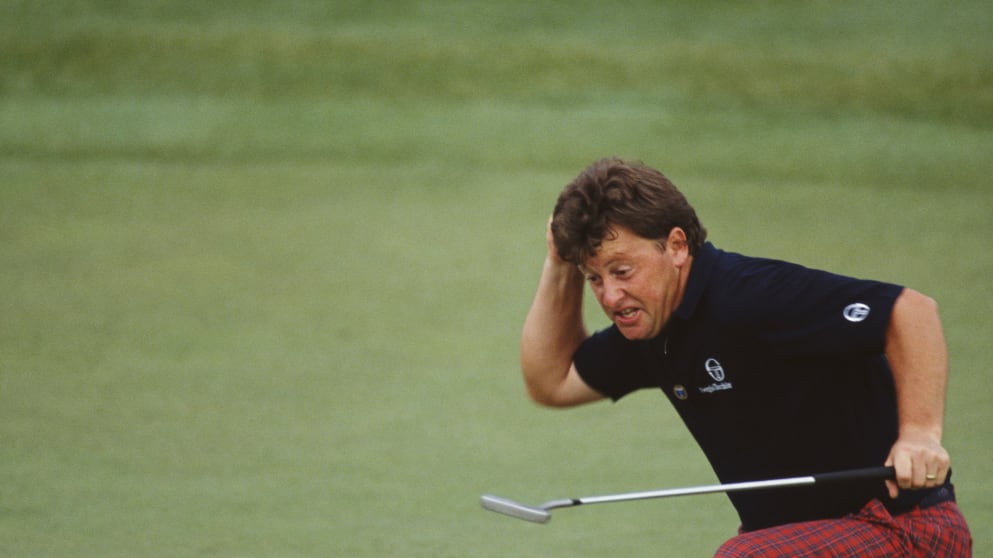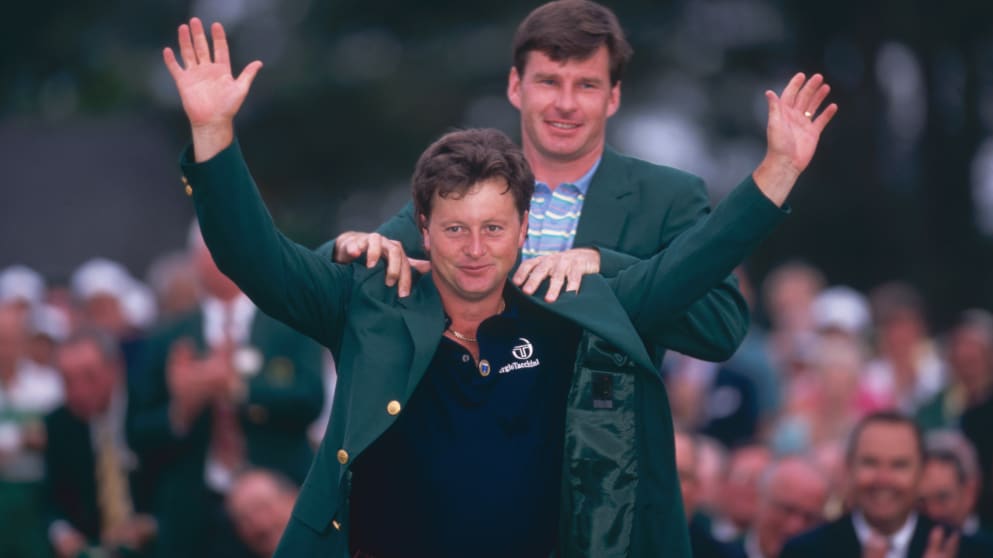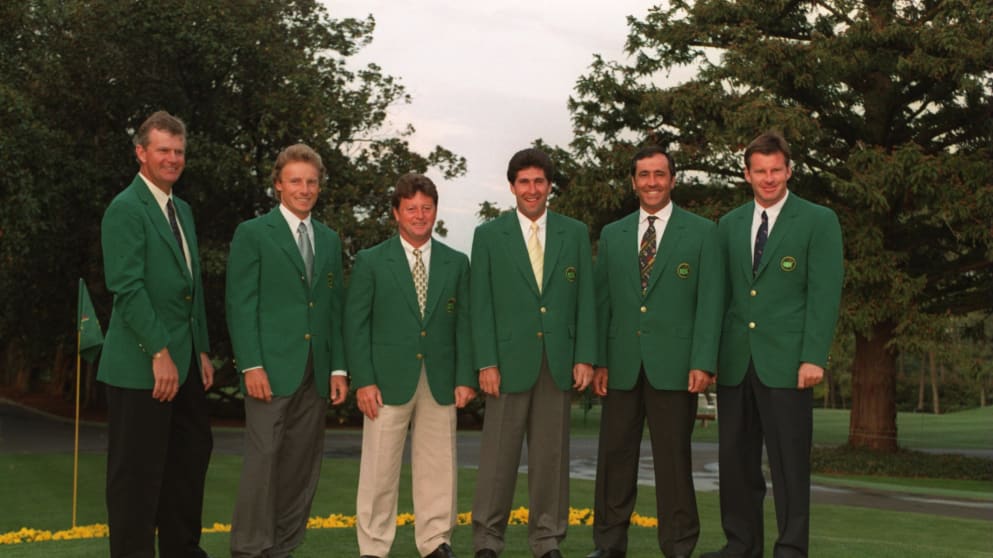It is 29 years since Ian Woosnam donned the Green Jacket and became the first Welshman to win the Masters Tournament.

As the world reflects on Augusta National tournaments of years gone by, we decided to revisit a remarkable story of equipment changes, of pressure, of patron gamesmanship, of American gallantry and, ultimately, of success.
Woosnam’s win arrived in the midst of a period of unparalleled dominance for European players in the Masters – a 20-year stretch from 1980 in which 11 Green Jackets were won by players from the continent and an era book-ended by triumphs for close friends and compatriots Severiano Ballesteros and José María Olazábal.
To put it a different way, to find another time of such supremacy from European players in one of the four Majors you have to go back to The Open and the period between the two World Wars, when Dick Burton claimed a princely sum of £100 in the summer of 1939 by becoming the sixth consecutive Englishman to hoist the Claret Jug and the 11th European to do so since 1920.
And in the spring of 1991, it was Woosnam’s time to shine.
Reliving Woosnam's 1991 #TheMasters win 🏆 pic.twitter.com/SGvIruGsz0
— The European Tour (@EuropeanTour) April 11, 2020
He might have gone on to lead Europe to Ryder Cup glory in 2006, won 29 European Tour titles as well as three Order of Merits and held the World Number One position for 50 weeks but for Woosnam, Major Championship glory at Augusta remains the high water mark of a glittering career.
“It was the greatest achievement of my career and something I had dreamed of for many years,” said Woosnam. “Winning the Masters allowed me to be recognised as a household name.”
Having usurped Sir Nick Faldo as World Number One on the Monday of the 1991 Masters week following his victory in the US PGA Tour’s USF&G Classic in New Orleans a fortnight previously, Woosnam could easily have felt constrained by the considerable weight of that title but the 5ft 4½in former amateur boxer has always been up for the fight. If anything, Woosnam felt compelled to step up to the mantle.
“My frame of mind was extremely confident on that first Monday of the Masters,” he recalled. “Becoming World Number One after winning in New Orleans gave me 'an edge' for that week to win. I don’t remember feeling any pressure at the time, just extremely confident. I felt brilliant, ready for anything.”
But victory did not come easy.

Not only did Woosnam have to battle the famed intricacies of Augusta National, one of the world’s most unforgiving courses, and Tom Watson, one of the finest exponents of the game and a two-time former Masters winner, he also had to contend with a partisan crowd.
Woosnam’s ebullient confidence coming into the week was soon moderated by an opening round 72 in which he struggled to adapt to Augusta’s challenging greens.
With his tee-to-green game firing on all cylinders, Woosnam made a drastic decision which ultimately turned around his bid to become the fourth consecutive European to wear the Green Jacket, following Sandy Lyle in 1988 and Faldo in 1989 and 1990.
“I changed my putter after the first round,” he recalled. “I went from a Ping to a Tad Moore which although I felt I wasn’t putting any better from three to four feet, it was significant in my confidence on the greens in Augusta. It seemed to do the trick.”
Rounds of 66 and 67 followed as the Welshman propelled himself into contention to secure a final round clash with Watson and Olazábal, who would go on to win the Green Jacket three years later and again in 1999.
If Woosnam had been prepared for the battle of a lifetime, what he had not expected was the crowd’s reaction.
“I played the last two days with Tom – one of my heroes in golf,” remembered Woosnam. “I feel playing with Tom gave me a boost because he played a similar kind of game to me. He’s the sort of guy that’ll tell you you’ve hit a good shot, when you have.
“I had some complications in the last round around the 13th and 14th with someone yelling out, ‘This is not a links course, this is Amen Corner’.
“What they didn’t realise was that the comment made me more determined and after that, Tom said he used to get that sort of thing when he played against Jack Nicklaus. ‘Don’t worry about it’, he told me. Basically, that was nice of him to say that.”

The ‘complication’ had occurred when Woosnam hooked a drive into Rae’s Creek at the long 13th hole, a mistake that was greeted by cheers from small sections of the galleries much to his consternation.
“That was bad,” he said. “I was very disappointed after having to wait 20 minutes on the tee, then hitting it in the creek and the crowd started yelling.
“At that point, I thought it had come back onto the fairway. Obviously, it’d gone in the creek and it felt like the crowd was against me. The big man against the little man. It felt I was back in the boxing ring.”
By the time they got to the 18th tee, Woosnam had a one-shot lead over Watson on 12 under, with Olazábal in the clubhouse on 11 under after a five on the last.
With his adrenalin pumping Woosnam let fly, driving the ball well beyond Sandy Lyle’s bunker on the left-hand side.
He said: “Tom hit into the trees on the right and for me at the time, the best option was to try to go over the bunkers into a place which was safe, which is what I did.
“In the end Tom took six, I came up short of the green in two and I was going to chip my third shot. I was a little nervous and decided to putt. It went to eight foot and I was lucky enough to have a par putt which was right to left, with suited my eye being a right hander.
“My caddie, Wobbly, agreed with me - one ball outside the right - and the rest is history. I was lucky enough to have a feeling that, if I missed the putt, there would be a play-off anyway, which made it a little easier.
“But in it went. It was every young golfer’s dream. When I received the Green Jacket from Nick Faldo, it was a great feeling to win my first Major.
“I became a part of history.”









